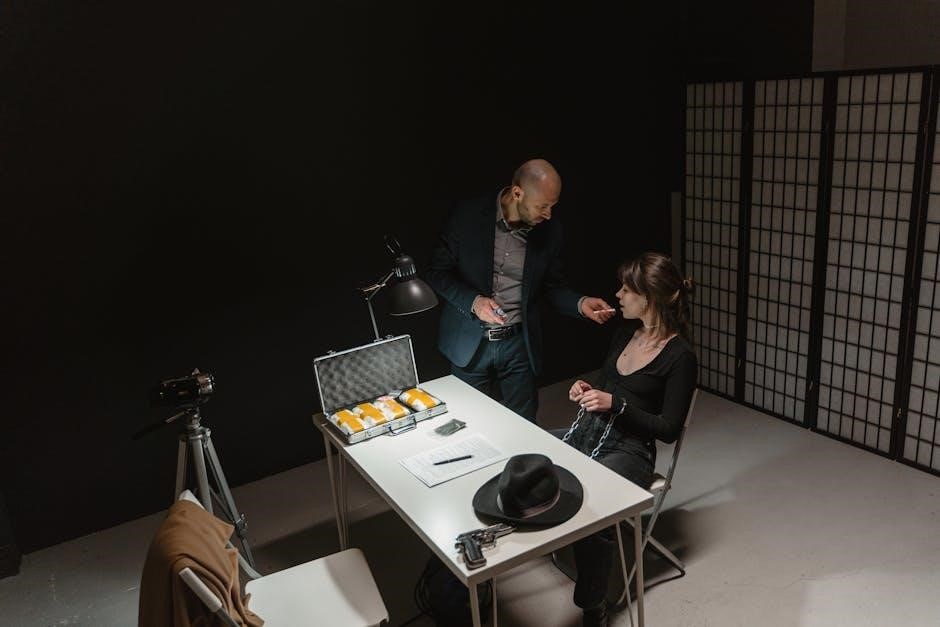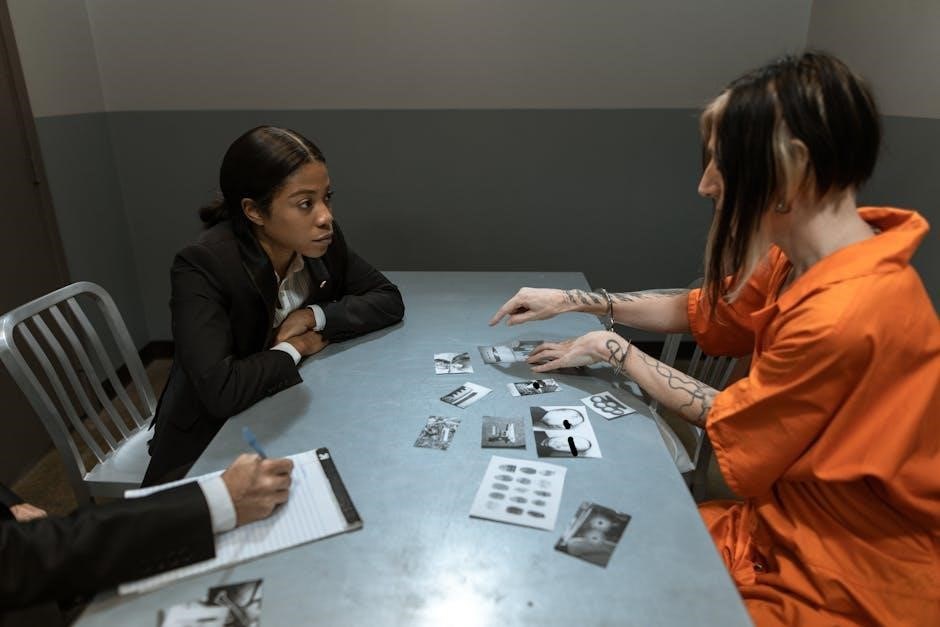Police competency-based interviews assess candidates’ skills and experiences through structured questions, focusing on specific competencies like communication, decision-making, and leadership. These interviews evaluate real-life examples to determine suitability for policing roles, ensuring candidates demonstrate the necessary abilities and values required for the job. This approach helps recruiters identify individuals who align with the organization’s standards and can handle the challenges of law enforcement effectively.
What Are Competency-Based Interviews?
Competency-based interviews are structured conversations designed to assess specific skills and behaviors relevant to a role. They focus on evaluating past experiences to predict future performance, often using frameworks like the STAR method. These interviews are popular in police recruitment as they standardize the evaluation process, ensuring fairness and consistency. Candidates are asked to provide detailed examples from their experiences, demonstrating competencies such as communication, problem-solving, and leadership. This approach allows recruiters to evaluate how well candidates align with the organization’s values and requirements, ensuring they possess the necessary abilities for the demands of law enforcement.
Importance of Competency-Based Interviews in Police Recruitment
Competency-based interviews are crucial in police recruitment as they ensure candidates possess the necessary skills and values for the role. By focusing on real-life examples, these interviews assess how well individuals handle challenging situations, making them a reliable predictor of future performance. This structured approach promotes fairness and consistency, ensuring all candidates are evaluated equally. It also aligns with the organization’s values, fostering a workforce that upholds integrity and public trust. These interviews help identify candidates who can effectively manage the unique demands of policing, ensuring the selection of capable and ethical officers to serve and protect communities.

Key Competencies Assessed in Police Interviews
Key competencies assessed include communication, decision-making, problem-solving, teamwork, integrity, and leadership. These skills are evaluated to ensure candidates align with policing standards and public service values.
- Communication Skills
- Decision-Making and Problem-Solving
- Teamwork and Collaboration
- Leadership and Initiative
Communication Skills
Communication skills are critical in policing, as officers must effectively interact with diverse communities, colleagues, and individuals in high-pressure situations. Competency-based interviews assess candidates’ ability to articulate thoughts clearly, listen actively, and adapt communication styles to different audiences. Examples from past experiences, such as de-escalating conflicts or explaining procedures, demonstrate proficiency. The ability to convey information concisely and empathetically while maintaining professionalism is essential. Strong communication ensures safety, builds trust, and fosters cooperation, making it a cornerstone of police work. Candidates must showcase their ability to communicate effectively in both routine and challenging scenarios, aligning with the ethical and operational demands of the role.
Decision-Making and Problem-Solving
Decision-making and problem-solving are vital competencies for police officers, as they often face complex, high-pressure situations requiring swift and informed actions. Competency-based interviews evaluate candidates’ ability to analyze challenges, identify solutions, and implement effective strategies. Candidates are asked to provide real-life examples of situations where they demonstrated sound judgment and successfully resolved issues. The STAR method is often recommended to structure these responses, ensuring clarity and focus on outcomes. Strong problem-solving skills reflect a candidate’s ability to remain calm under pressure, prioritize tasks, and make ethical decisions aligned with policing values. Effective decision-making ensures public safety and upholds the integrity of law enforcement operations.

Teamwork and Collaboration
Teamwork and collaboration are essential competencies for police officers, as policing often requires working effectively within teams to achieve common goals. Competency-based interviews assess candidates’ ability to cooperate with others, share information, and contribute to group efforts. Candidates are asked to provide examples of situations where they worked collaboratively to resolve issues or complete tasks. Demonstrating an ability to listen, communicate, and support team members is crucial. Examples might include working on a group project, resolving conflicts, or contributing to a community initiative. Strong teamwork skills reflect a candidate’s ability to build trust, foster inclusivity, and work toward shared objectives, which are critical for effective policing and community engagement.

Integrity and Impartiality
Integrity and impartiality are fundamental values in policing, ensuring officers act ethically and without bias. Competency-based interviews evaluate candidates’ commitment to upholding these principles. Questions focus on scenarios where candidates demonstrated honesty, fairness, and adherence to ethical standards. Examples might include handling conflicts of interest, making unbiased decisions, or reporting misconduct. Candidates must show they can maintain professionalism under pressure and consistently apply ethical judgment. Strong responses highlight a clear moral compass and the ability to serve the community impartially, which are vital for building public trust and maintaining the integrity of the police force. Demonstrating these traits ensures candidates align with the service’s core values.
Leadership and Initiative
Leadership and initiative are critical competencies for police officers, as they often work in dynamic and unpredictable environments. Competency-based interviews assess candidates’ ability to lead, motivate others, and take proactive steps in challenging situations. Questions may ask for examples of guiding a team, resolving conflicts, or initiating solutions to problems. Strong answers demonstrate clear direction, effective communication, and the ability to inspire confidence. Candidates should highlight instances where they took charge, made informed decisions, and achieved positive outcomes. Showcasing leadership skills and the willingness to take initiative illustrates a candidate’s potential to excel in both individual and team-based policing roles, ensuring they can contribute effectively to the organization’s success.

Preparing for Competency-Based Police Interviews
Effective preparation involves understanding the STAR method, researching common questions, and practicing structured responses. Familiarize yourself with the competency framework and rehearse real-life examples to build confidence and clarity.
Understanding the STAR Method
The STAR method is a structured approach to answering competency-based questions, standing for Situation, Task, Action, and Result. It provides a clear framework to organize responses effectively. Begin by describing the situation, setting the context. Next, outline the task you faced, explaining your role and objectives. Then, detail the actions you took, focusing on specific skills and behaviors. Finally, conclude with the result, emphasizing the outcomes and what you learned. This method ensures your answers are concise, relevant, and demonstrate your competencies clearly, making it easier for interviewers to assess your suitability for the role.
Researching Common Competency-Based Questions
Researching common competency-based questions is crucial for effective preparation. Familiarize yourself with questions related to communication, decision-making, leadership, and teamwork. Reviewing police competency-based interview questions and answers PDFs provides insight into typical queries and expected responses. Look for resources like official police websites, career guides, or reputable preparation materials. Understanding the types of questions asked helps tailor your answers to align with the competencies valued in policing roles. This research enables you to anticipate topics, structure your responses, and demonstrate your skills confidently during the interview. It also highlights the importance of using real-life examples to showcase your abilities effectively.
Practicing with Sample Answers
Practicing with sample answers is essential to refine your responses for competency-based interviews. Use the STAR method (Situation, Task, Action, Result) to structure your answers clearly. Review police competency-based interview questions and answers PDFs to understand expected formats and content. Practice answering common questions aloud, focusing on concise and relevant responses. Utilize online resources or simulation tools to mimic real interview scenarios, ensuring your answers align with the required competencies. Regular practice helps build confidence, improves articulation, and ensures your examples demonstrate the skills and values sought by police recruiters. This preparation enhances your ability to deliver polished, professional responses during the actual interview.

Example Competency-Based Questions and Answers
Example questions include: “Describe a time you demonstrated leadership” or “Tell me about a difficult decision you made.” Answers should follow the STAR method, providing clear, concise examples that highlight relevant skills and outcomes.
Question: Describe a Time When You Demonstrated Leadership
This question evaluates your ability to lead and inspire others. Use the STAR method: Situation, Task, Action, Result. For example, describe a team project where you took charge, coordinated tasks, and achieved success. Highlight your decision-making, communication, and problem-solving skills. Show how your leadership resulted in a positive outcome, such as completing a project ahead of schedule or improving team morale. Be specific about your role and actions, demonstrating how you motivated others and handled challenges. This showcases your potential to lead effectively in a policing role, where leadership is crucial for team success and community trust.

Question: Tell Me About a Situation Where You Made a Difficult Decision
When faced with a challenging decision, remain calm and systematic. For example, in a team setting, you might have encountered a conflict or an ethical dilemma. Describe how you analyzed the situation, weighed the options, and chose the most ethical or effective course of action. Use the STAR method: Situation, Task, Action, Result. Explain your thought process and how you communicated your decision to others. Highlight the outcome, such as resolving the conflict or improving team performance. This demonstrates your ability to handle tough scenarios, a critical skill for policing, where decisions often impact safety and community trust.
Question: Provide an Example of Effective Communication in a Challenging Situation
In a challenging situation, such as mediating a community dispute, effective communication is crucial. Describe how you actively listened to both parties, ensuring their concerns were understood. Use clear and empathetic language to de-escalate tensions. For example, you might explain, “I understand this issue is important to both of you, and I’m here to help find a fair solution.” By remaining calm, speaking clearly, and showing empathy, you can build trust and guide the conversation toward a resolution. This demonstrates your ability to communicate effectively, even in difficult circumstances, a vital skill for policing where building community trust is essential.

Tips for Success in Police Competency-Based Interviews
Prepare thoroughly, practice the STAR method, and use real-life examples. Stay calm, maintain eye contact, and answer clearly. Show confidence and honesty to make a positive impression.
Structuring Your Answers Clearly
Structuring your answers clearly is essential for success in police competency-based interviews. Use the STAR method (Situation, Task, Action, Result) to organize your responses effectively. Begin by setting the context, then outline the task or problem, followed by the actions you took, and conclude with the outcome. This method ensures your answers are concise, focused, and demonstrate your competencies clearly. Avoid unnecessary details and stay relevant to the question. Practice structuring your answers beforehand to enhance clarity and confidence. Clear communication of your thought process and decision-making skills will showcase your suitability for the role. This approach helps interviewers assess your abilities accurately and efficiently.
Using Real-Life Examples
Using real-life examples is crucial when answering police competency-based interview questions. These examples demonstrate your practical skills and experiences, making your answers more credible and relatable. Choose specific instances from your past that align with the competencies being assessed, such as leadership, communication, or problem-solving. Be detailed and explain your role, actions, and the outcome to show how you applied the competency effectively. Avoid generic statements and focus on situations where you made a tangible impact. By providing concrete examples, you showcase your ability to handle real-world scenarios, which is essential for policing roles. This approach helps interviewers evaluate your suitability accurately and confidently.
Staying Calm and Confident
Staying calm and confident is essential during police competency-based interviews. Take deep breaths to manage nerves and maintain a positive mindset. Preparation is key—research common questions and practice answers to build confidence. Avoid rushing responses; take a moment to gather your thoughts before speaking. Maintain eye contact and use open, confident body language to convey professionalism. Remember, confidence comes from being well-prepared and genuinely showcasing your skills and experiences. Even if you feel nervous, focus on presenting yourself authentically and demonstrating your suitability for the role. A calm demeanor and self-assured responses will leave a positive impression on the interview panel.

Acing police competency-based interviews requires thorough preparation and confidence. By understanding key competencies, using the STAR method, and practicing answers, candidates can effectively showcase their suitability and skills, ensuring a successful outcome in their pursuit of becoming a police officer.
Final Thoughts on Acing Competency-Based Interviews
To excel in police competency-based interviews, focus on showcasing real-life examples that align with key competencies. Use the STAR method to structure your answers, ensuring clarity and detail. Practice common questions thoroughly and stay calm during the interview. Demonstrating honesty, confidence, and a genuine passion for policing will leave a lasting impression. Tailor your responses to highlight your skills and experiences, proving you are a strong candidate for the role. Preparation is key, so review the competencies and practice your delivery to ensure success.